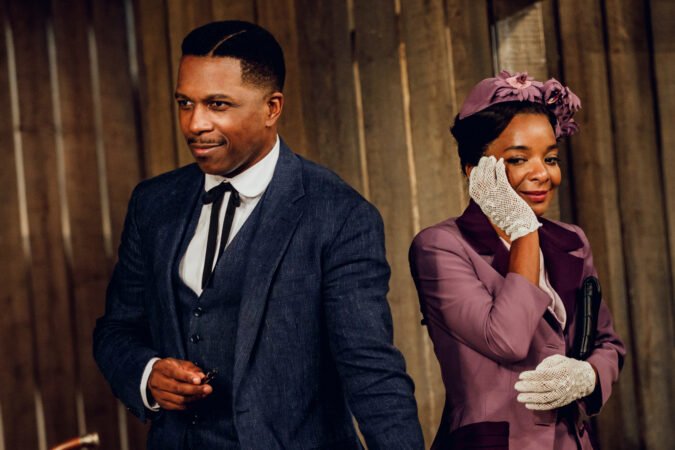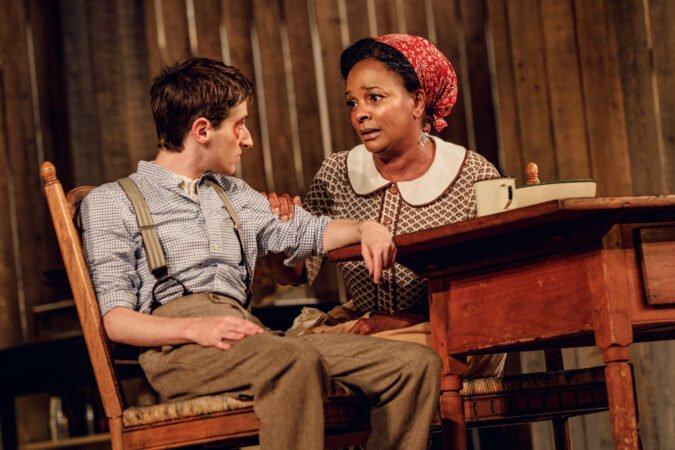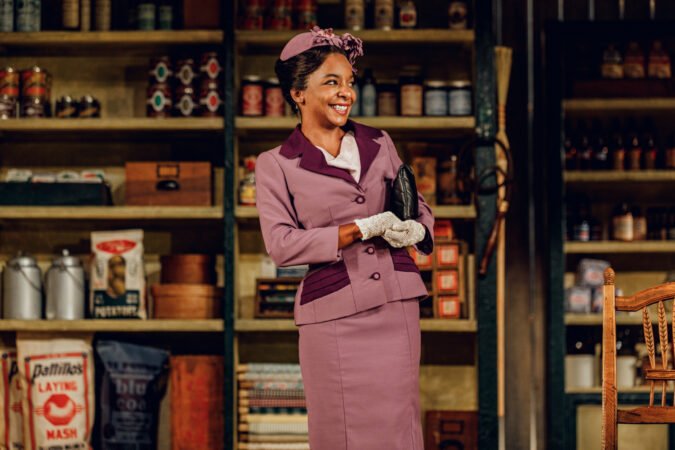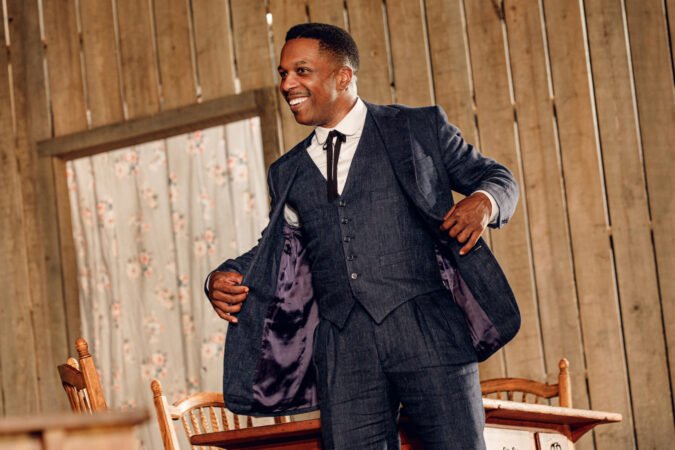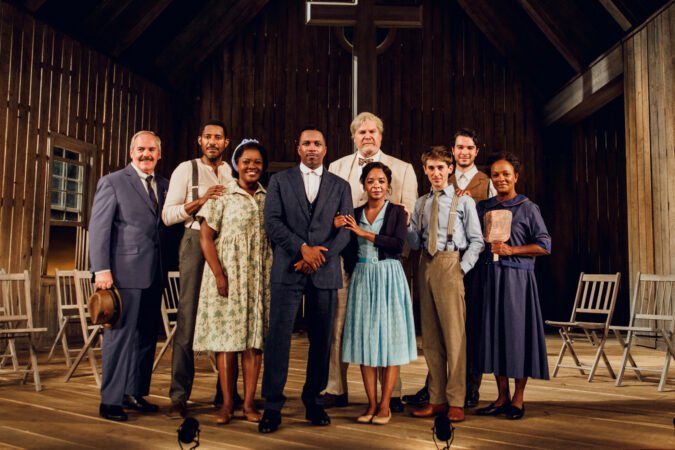Broadway's "Purlie Victorious:' Hallelujah! Now To Be Shown On PBS
The show: “Purlie Victorious: A Non-Confederate Romp Through the Cotton Patch” played Broadway’s Music Box Theatre this fall and early winter and will now be seen on PBS’s Americans Masters on May 24. Circle your calendar.
That’s quite the title: But significantly it signals its point of view (“non-Confederate”) and tone (“romp”) — but with more meaningful intent, too. Ossie Davis’ 1961 play is still vital — and full of vitality — 63 years after it first debuted on Broadway, when the civil-rights movement was just starting to get the national spotlight.
What makes it special?: It stars Leslie Odom Jr., who won a Tony Award for his role in “Hamilton.” Also starring is one of the blazing new lights of Broadway: Kara Young, who received Tony nominations for her other two Broadway shows, “Cost of Living” and “Clyde’s.” She deserves her third out of three — if not a win— for her performance here.
The title is familiar, kind of: : Davis’ play was also made into a 1963 film re-titled “Gone Are the Days” (one presumes to comfort audiences that the racism depicted in the narrative was in the past).
The play was also the basis of the 1970 musical “Purlie,” , which starred Cleavon Little and Melba Moore, who tore down the house with “I Got Love” on the Tony Awards show — and then received a Tony. Also in that cast was the great Novella Nelson, Linda Hopkins and “The Jeffersons”’s Sherman Hemsley. It had a glorious score by Gary Geld with lyrics by Peter Udell and book by Ossie Davis, Peter Udell and Philip Rose.
What’s it about?: Set “in the recent past,” Purlie Victorious Judson, a Black self-made traveling preacher from Georgia returns to his rural hometown where he grew up among sharecroppers with the goal of buying and transforming the town’s derelict church known as “Big Bethel.”
Though he has no money to make that happen, he comes up with a scheme to present a young guileless woman named Lutiebelle Gussie Mae Jenkins (Young, petite but a powerhouse) to pretend to be a cousin of a recently departed relative in order to claim an inheritance — and with that money save the church where he will preside.
But dominating the town is a racist tyrant and plantation owner: Ol' Cap'n Cotchipee — who whipped Purlie years ago when he was in servitude and who then fled town. The Cap’n is now wary of this new and very odd claimant but Purlie is determined to make his plan work. Naturally Lutiebell falls head over heels for the charismatic Purlie — and who can blame her?
Also in on the scheme is Purlie’s skeptical sister-in-law Missy (Heather Alicia Simms), and Purlie’s brother, Gitlow (Billy Eugene Jones), who works for Ol’ Cap’n and seemingly “the dutiful Negro.” Then there’s Idella (warmly played by Vanessa Bell Calloway), the Ol’ Cap’n’s housekeeper who has raised the Cap’n’s slip of a son, Charlie (Noah Robbins, wonderful), who turns out to be quite the progressive.
But for all the farcical fun, there’s seriousness at its core: reminding us of rightful inheritances and promises to be kept when the play was first written, and now.. That is the beauty of Davis’ play, the performances and Kenny Leon’s superb and breathless direction. In a work that could easily have been dated, corny or worse, Leon has given it a sense of urgency and has directed an ensemble of actors so in tune with the tone. (If only they gave out a Tony for ensemble work.)
Odom is a dazzling ball of fire as Purlie: part hustler, part visionary, and all nerve; a man who is seeking justice for his community and redemption for himself. It’s not just Odom’s verve that is so striking, but the sheer physicality of the performance. Just watch him bend, twist, contort his body with the grace of a dancer to maneuver out of whatever corner in which he finds himself. You, too, will become a true believer when you hear him preach in rhapsodic terms, his cadences letting the words bounce along in delight: “Let us, therefore, stifle the rifle of conflict, shatter the scatter of discord, smuggle the struggle, tickle the pickle, and grapple the apple of peace!” But Odom shows us just enough cracks in this preacher’s fierce confidence to ground his rhetorical flights, and we quickly realize he’s not only aiming to inspire others with his words — but himself as well.
Young once again shows that she is one of the most versatile and accomplished actors on Broadway right now. The woman can do anything and here she plays farce to perfection while giving heart and realness to the role, too.
Billy Eugene Jones has one of the trickiest parts, keeping Gitlow — the plantation’s “deputy for the coloreds,”— from being a negative stereotype but Jones makes us clearly see that for all his character’s obsequiousness he is a survivalist — and nobody’s fool. The bullwhip-carrying Cap’n, however, is, albeit still a powerful and controlling one. Jay O. Sanders is terrific in yet another challenging part, managing to make this comically blustering character ripe for mocking without easing up on his danger.
One more thing: Derek McLane has created a stunning barn-raiser of a set that has a heavenly reveal.
Critical thoughts?: I’ll just say it. “Purlie Victorious’ is my favorite play of the season, and perhaps for many seasons. I can’t remember the last time a non-musical play has given me such joy in the performances, staging and he entire production.
Thoughts on leaving the parking lot: Because of the masterful blend of satire and seriousness in a very American idiom and spirit, I think this is a show that Mark Twain would have loved — and perhaps wish he had written.
One more thought: Though the show has now closed, I hope Tony nominations and voters will remember the performances and all the creatives involved in this production. Through the PBS presentation won’t have the excitement of live theater, I hope it will be a reminder of brilliant work.

